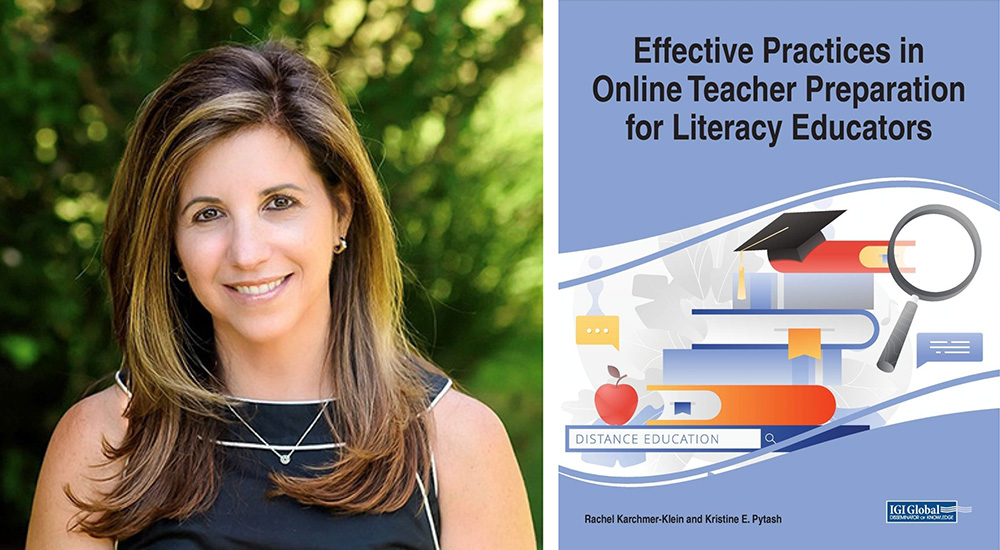School of Education
How Learning Thrives in Digital Classrooms

The School of Education leads in researching effective online instruction
The number of college students enrolled in online degree programs continues to grow. According to recent data from the U.S. Department of Education, one-in-six students are now enrolled in online-only programs, and nearly one-in-three will take at least one online course before graduation. Yet, faculty and administrators often lack evidence-based research and professional development that will help them implement effective learning practices in digital classrooms.
Digital course design tends to be a product of on-the-job training, a problem that becomes even more acute in online programs for education, suggests Rachel Karchmer-Klein, associate professor in the School of Education (SOE) at the University of Delaware, where she has pioneered the development of high quality online instruction.
Her courses integrate evidence-based teaching practices while using online technology to maximize interactivity and collaboration. In the Teacher Leadership program, for example, Karchmer-Klein engages students in digital peer review. Using Vialogues, a free, video-based discussion tool, students record a coaching conversation and share it with their classmates. Classmates can then review each other’s work based on what they’ve learned in the course, sharing strengths and areas for improvement directly in Vialogues while watching the recording.
“My online courses engage students in interactive and collaborative learning opportunities that they may not experience in traditional face-to-face classes,” said Karchmer-Klein. “Developing and teaching within two fully online graduate programs in the SOE gave me the time and space to study instructional design and the implementation of online pedagogy. I believe in online learning, but it needs to be done well.”
In an ill-conceived digital classroom, there is a higher likelihood for aspiring educators to miss out on valuable training and collaborative learning experiences that will prepare them for leading classrooms of their own.
In her new book, Effective Practices in Online Teacher Preparation for Literacy Educators (2019) with coeditor Kristine Pytash of Kent State University, Karchmer-Klein curated 16 research papers from leading scholars in online education that study the implementation of evidence-based learning practices to help bridge the divide between physical and digital classrooms. Karchmer-Klein taught her first online course in 2003 and has published extensively on how to prepare children, adolescents, and adults to read and write effectively in digital spaces.
“Merely connecting [students] to activities using digital tools does not result in thoughtful reflection, collaboration, or knowledge-building, indicators of effective online teaching practices” write Karchmer-Klein and Pytash in the book’s preface. “Yet, research indicates many faculty do not know how to leverage technology to implement pedagogical practices specific to online environments.”
Without intervention, this problem is likely to grow. Enrollment in online courses increased 5.7 percent between fall 2016 and fall 2017. Moreover, nearly one-third of students pursuing master’s degrees are now enrolled in online programs.
“Online literacy programs are no longer the future, but instead the present,” write Karchmer-Klein and Pytash. “Therefore, literacy researchers must turn the lens on their own teaching to study the most effective practices to implement when preparing teacher educators.”
For specialized fields like literacy education, evidence-based research documenting best learning practices for digital classrooms is scarce. Given the lack of research, Karchmer-Klein and Pytash suggest that faculty begin with best practices for face-to-face learning environments and then determine how digital tools can be incorporated into those same practices and leveraged to achieve similar results.
For her contributions to research on digital learning technologies, Karchmer-Klein received the 2016 Technology in Reading Research Award from the International Literacy Association’s (ILA) Technology in Literacy Education Special Interest Group (TILE-SIG).
Karchmer-Klein is the faculty coordinator for the M.Ed. in Literacy and M.Ed. in Teacher Leadership online programs in the School of Education.
Article by Jordan Howell



